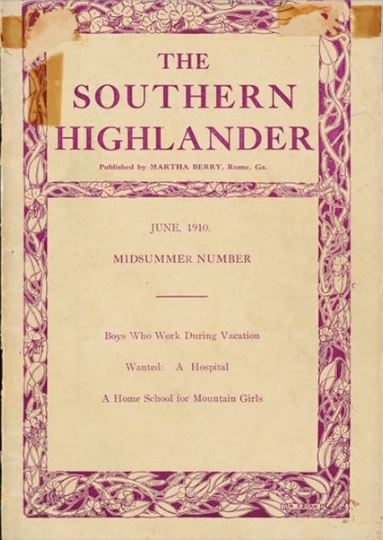Based at the University of Georgia Libraries, the Digital Library of Georgia is a GALILEO initiative that collaborates with Georgia’s libraries, archives, museums and other institutions of education and culture to provide access to key information resources on Georgia history, culture, and life. This primary mission is accomplished through the ongoing development, maintenance, and preservation of digital collections and online digital library resources. DLG also serves as Georgia’s service hub for the Digital Public Library of America and as the home of the Georgia Newspaper Project, the state’s historic newspaper microfilming project. Visit the DLG at dlg.usg.edu.
Berry College’s Southern Highlander now freely available online
ATHENS, Ga. — The Digital Library of Georgia (DLG) is pleased to announce the digitization of 3,124 pages from Berry College’s Southern Highlander covering the period of 1907 to 1942. The Southern Highlander, the official magazine of and published by the Berry Schools in Mount Berry, Ga., documents the early history of the schools founded by philanthropist Martha Berry in 1902 to serve the rural poor. The magazine also details social conditions and the importance of community-based education.
The Southern Highlander is a unique publication that raised money while promoting the mission of the Berry Schools worldwide. The Southern Highlander offers firsthand knowledge of social and historical topics of the day, including agriculture, the influenza epidemic of 1918, World War I, educational philosophy, and religious work on campus and in north Georgia.
The digitization of the Southern Highlander will provide access to some of the oldest and most frequently requested Berry Schools materials, a boon for scholars, students, historians, alumni, and community members interested in studying the rich, early history and cultural heritage of the Berry Schools, Martha Berry, and early 20th-century culture and history in rural, north Georgia.
While the Southern Highlander is rich in history, it is also an excellent representation of Berry’s focus on a comprehensive education of the head, heart, and hands,” said Jessica Hornbuckle, digital initiatives librarian. “Working with the Digital Library of Georgia to digitize the Southern Highlander is the perfect opportunity to share Berry’s oldest publication and the school’s legacy beyond the campus gates.”
The digitized materials are available at dlg.usg.edu/collection/gbc_berry-193.
About the Berry College Archives
The Berry College Archives was established in 1986 and serves as the primary repository for materials pertaining to the Berry Schools, Berry College, and founder, Martha Berry. The principal purpose of the archives is to appraise, collect, preserve, maintain, and make accessible records of historical value. In addition, the archives seeks to educate its constituents about its holdings, policies, and procedures through outreach and instructional activities.



